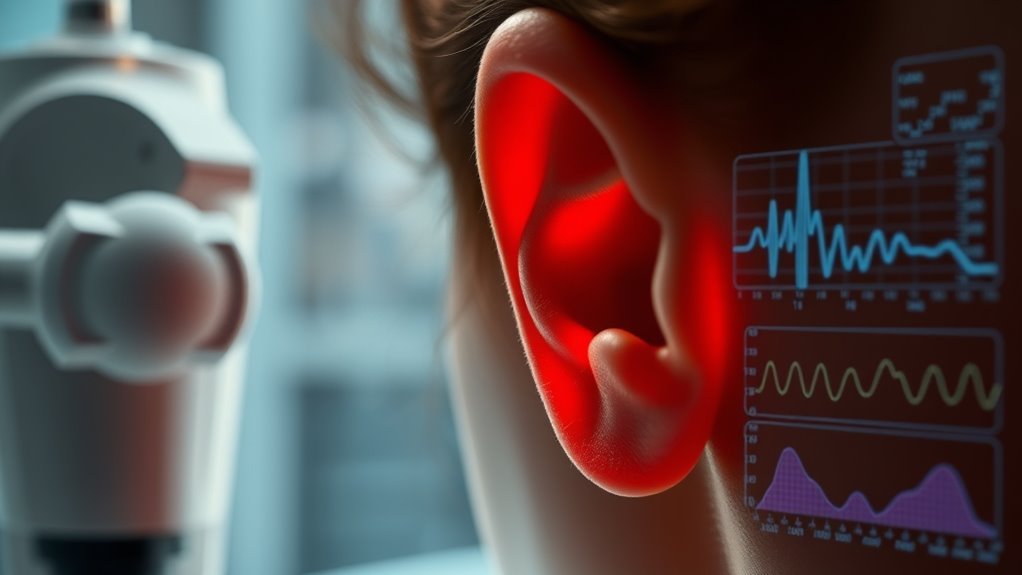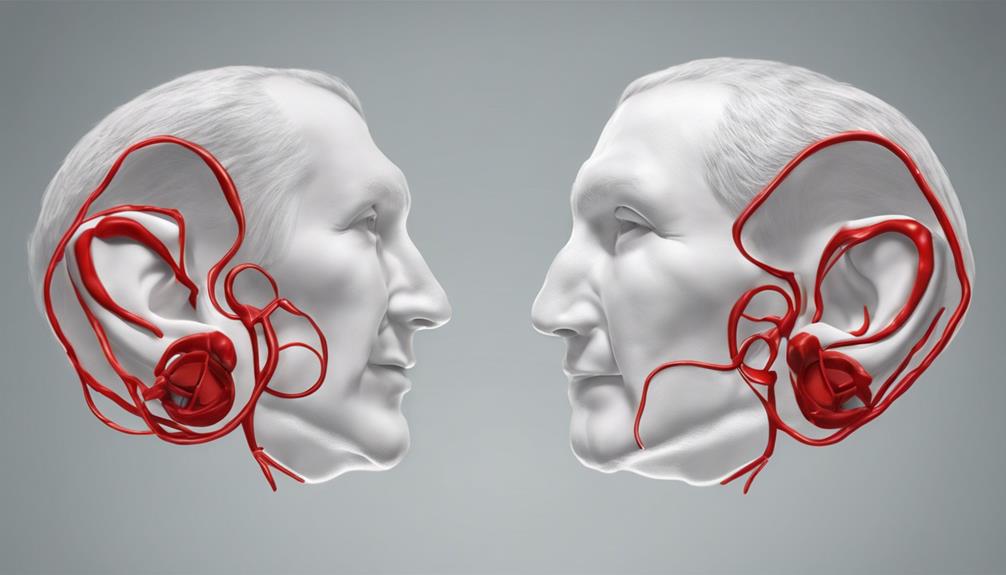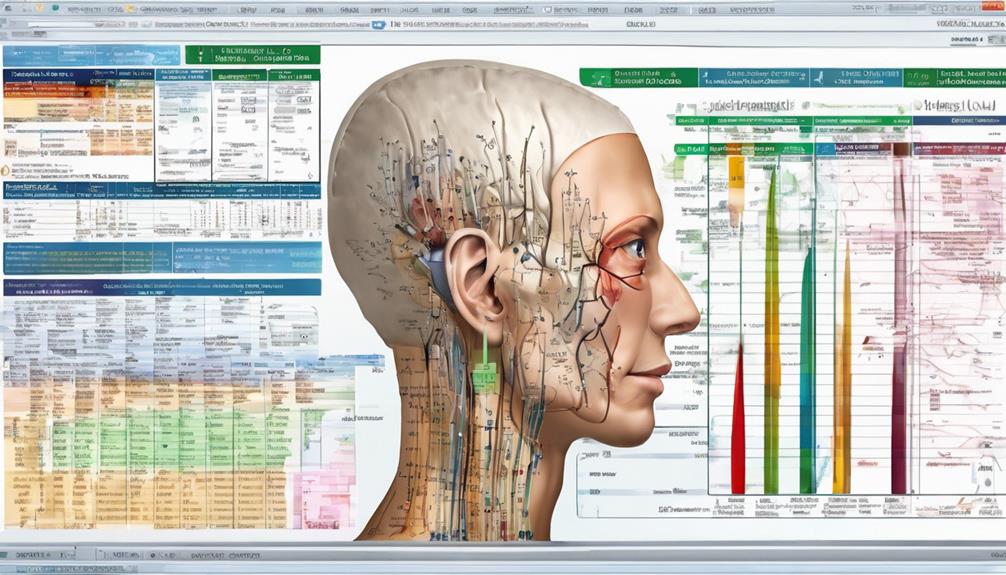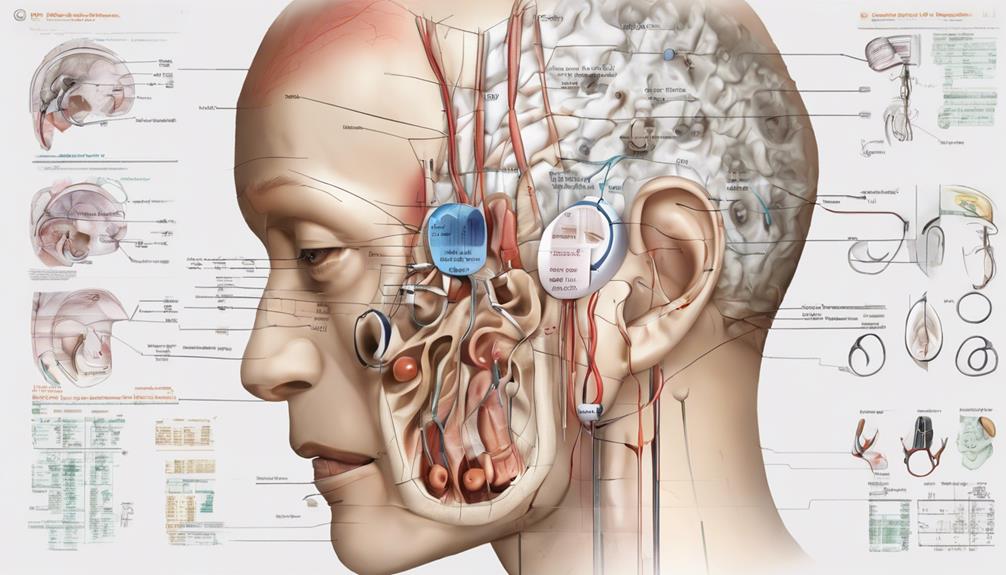In 2025, diagnosing autoimmune inner ear disease involves combining clinical history, audiological tests, genetic markers, and immune activity evidence. You’ll need to identify gene variants linked to immune responses in the inner ear and confirm immune system involvement through blood tests and immune markers. A positive response to immunotherapy, like corticosteroids, further supports the diagnosis. If you want to understand how these criteria help distinguish AIED from other causes of hearing loss, keep exploring.
Key Takeaways
- Diagnostic criteria integrate clinical history, audiological tests, genetic markers, and immune evidence for accurate identification.
- Presence of specific gene variants indicates immune-mediated inner ear damage, aiding differentiation from other causes.
- Response to immunotherapy, such as corticosteroids, supports the autoimmune diagnosis of inner ear disease.
- Blood tests for autoantibodies and immune markers are essential components in confirming AIED.
- Early diagnosis relies on combined genetic and immunological data, enabling targeted and timely treatment strategies.
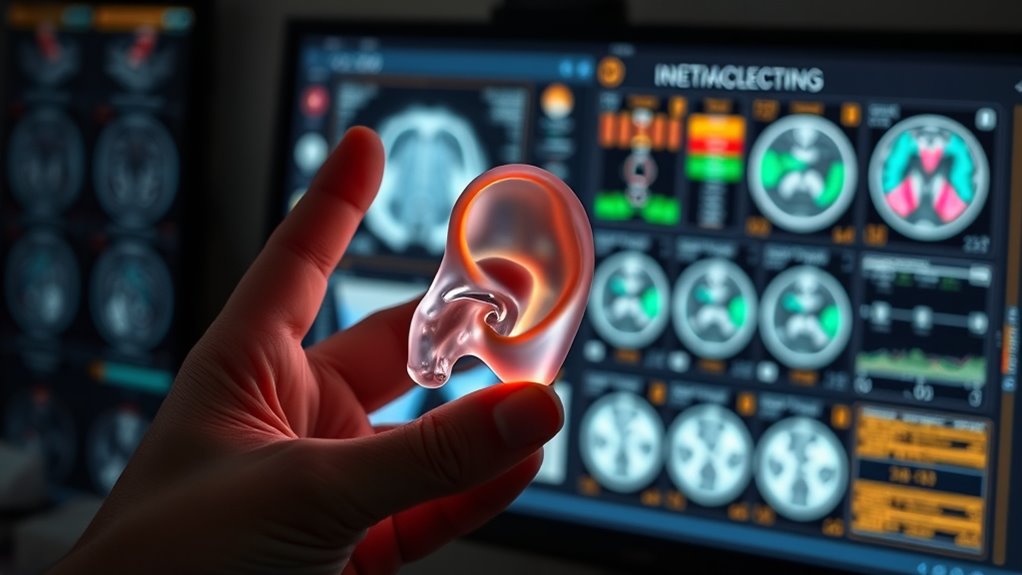
Have you ever experienced sudden hearing loss or balance problems with no clear cause? If so, you might be dealing with autoimmune inner ear disease (AIED), a condition where your immune system mistakenly attacks your inner ear structures. Diagnosing AIED can be challenging because its symptoms often resemble other ear disorders, but recent advances have improved the process considerably. In 2025, the diagnostic criteria rely heavily on identifying specific genetic markers and utilizing immunotherapy approaches to confirm the autoimmune nature of the disease.
Genetic markers have become increasingly valuable in diagnosing AIED. Researchers have identified certain gene variants that predispose individuals to autoimmune responses targeting inner ear tissues. These genetic markers help distinguish AIED from other causes of hearing loss or vertigo, especially when symptoms are atypical or persistent. When you undergo testing, detecting these markers can provide crucial clues, indicating an immune-mediated process rather than infection or trauma. This genetic insight accelerates diagnosis and allows for more targeted treatment strategies, reducing unnecessary interventions and delays.
Immunotherapy approaches have also transformed how clinicians confirm AIED. Traditionally, diagnosis was largely based on clinical presentation and ruling out other causes, but now, specific immunological tests and response to immunosuppressive therapy serve as key criteria. For example, if you exhibit rapid hearing deterioration that responds favorably to corticosteroids or other immunosuppressive drugs, it strongly suggests an autoimmune basis. Moreover, newer immunotherapy approaches are tailored to modulate immune responses more precisely, minimizing side effects while effectively controlling symptoms. These treatments are often initiated early once autoimmune activity is confirmed, helping preserve hearing and balance functions.
The integration of genetic markers with immunotherapy responses allows clinicians to establish a more definitive diagnosis of AIED. In 2025, diagnostic criteria emphasize a combination of clinical history, audiological assessments, detection of relevant genetic markers, and evidence of immune activity. Blood tests measuring specific autoantibodies or immune markers, alongside genetic testing, help differentiate autoimmune inner ear disease from other cochlear or vestibular disorders. When you respond positively to immunotherapy, especially corticosteroids or targeted biologics, it further confirms the autoimmune component, reinforcing the diagnosis.
Ultimately, the evolving criteria in 2025 aim to provide a clearer, more precise diagnosis of AIED, enabling timely and effective treatment. Recognizing the role of genetic markers and immunotherapy approaches not only improves diagnostic accuracy but also enhances your chances of preserving hearing and balance. As research continues, expect even more personalized strategies that target the immune system directly, offering hope for better outcomes and quality of life.
Frequently Asked Questions
Are There New Genetic Markers Associated With AIED in 2025?
You’re wondering if new genetic markers have been identified for AIED in 2025. Recent research highlights ongoing biomarker discovery, aiming to improve diagnosis. While specific genetic predispositions are still under investigation, emerging data suggests potential markers linked to immune regulation. These advances could help you better understand individual risks and tailor treatments, making genetic testing a more integral part of diagnosing autoimmune inner ear conditions in the near future.
How Does AIED Differ From Other Autoimmune Diseases Affecting the Ear?
You might think all autoimmune ear conditions are similar, but autoimmune inner ear disease (AIED) differs from other autoimmune diseases affecting the ear. AIED primarily targets the inner ear, causing rapid hearing loss and balance issues, unlike systemic autoimmune diseases that affect multiple organs. Disease differentiation relies on specific diagnostic criteria, emphasizing inner ear involvement, auditory symptoms, and immune response, helping you distinguish AIED from other autoimmune ear disorders effectively.
What Emerging Therapies Are Being Tested for AIED?
You’re curious about emerging therapies for AIED. Researchers are testing innovative options like gene therapy to target immune responses directly, potentially reducing inflammation and preserving hearing. Stem cell regeneration also shows promise, aiming to repair damaged inner ear tissues. These approaches could revolutionize treatment, offering more effective and lasting solutions. Keep an eye on clinical trials, as these therapies are still in experimental stages but hold exciting potential for the future.
Can Lifestyle Changes Prevent or Manage AIED Symptoms?
You might wonder if lifestyle changes can help prevent or manage AIED symptoms. While they won’t cure it, diet modifications and stress management can make a difference. Eating a balanced diet reduces inflammation, and managing stress helps regulate your immune response. Incorporate these habits into your routine to support your overall ear health and potentially lessen symptom severity, complementing medical treatments effectively.
How Reliable Are Current Diagnostic Imaging Techniques for AIED?
Think of diagnostic imaging like a lighthouse guiding you through fog—helpful but not flawless. The imaging accuracy for AIED has improved, yet diagnostic limitations still exist, making it challenging to confirm the disease definitively. While advanced scans can detect ear inflammation or degeneration, they might not reveal the autoimmune process directly. You should consider imaging as a valuable tool, but always combine it with clinical evaluation for accurate diagnosis.
Conclusion
As you navigate the evolving landscape of autoimmune inner ear disease, understanding the 2025 diagnostic criteria is your guiding light. Think of these criteria as a compass, helping you steer confidently through complex symptoms and tests. With early and accurate diagnosis, you can open the door to effective treatment, offering hope where uncertainty once reigned. Embrace this knowledge as your strongest tool—an anchor amid the storm of uncertainty, guiding you toward better hearing and quality of life.

